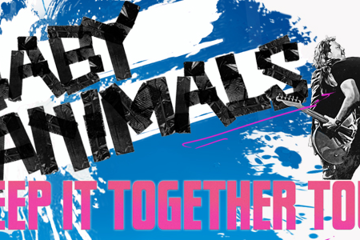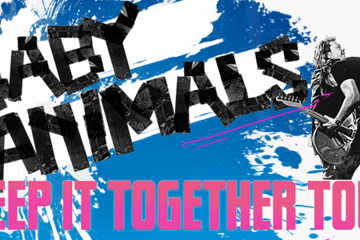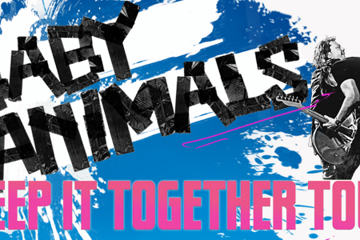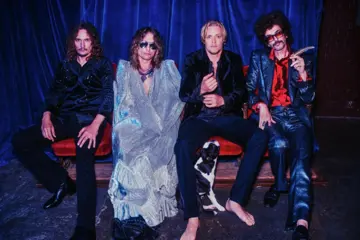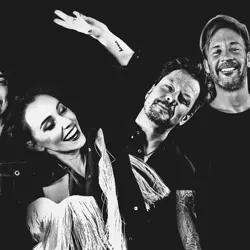 Baby Animals
Baby AnimalsLooking quite possibly the same as she did when caught in the glare of the spotlight in the early '90s, Suze DeMarchi opines, “The music industry is a fucking nightmare. Last night we played a show at this pop-up venue for Rolling Stone in Sydney. We did a Q&A and this young girl from a band was in the audience. She asked me this question – she was so upset, so angry: 'Can you tell me, how do you make it in this industry? It's a joke this industry. It's a fucking joke'. I told her, 'First of all you have to really love music. Second, you have got to have a great team around you'. Without my first manager John Woodruff we would never have [gotten] anywhere, because we were young and just wanted to play. I felt bad for her. Now for kids… it's difficult. We were lucky.”
Luck may not play as big a part in DeMarchi's career as she claims. Leaving school at 15, quitting a bank job at 16 and living on the road with her band Baby Animals at 17 shows a confidence and a willingness to sacrifice home comforts for experience. “Sometimes we'd do three shows a day,” she says of her beginnings as part of Perth rockers Photoplay. “We'd do a university lunchtime show then a pub gig, which would be three sets, then we'd do a nightclub gig, three sets again; three different forty-minute sets,” she laughs. “That's where we learned how to play. I did that for two years. I got my work ethic from thinking it's no big deal to drive [from Perth] to Geraldton to do a set or three. Now I wouldn't want to – I have enough trouble getting through a one-hour-forty-minute set!'
Despite the lifestyle change from platinum-selling, world-touring rockstar to mother/wife of guitar icon Nuno Bettencourt, DeMarchi claims that her new life in Sydney and the reinvention of Baby Animals doesn't feel like a job. “When I'm onstage it doesn't [feel like a job], the other stuff does,” she laughs. “I hate the music business. I really, really loathe it. I hate the way it's structured. I mean, it's changing but…” she trails off, shaking her head. 'We've gone independent now because I was so tired of signing deals with labels that just fuck you over. The worst thing about it is that they have control over you forever – they own your copyright forever. This way we own it, we can share the load, you can do things that you want to do. You're not going to reach as many people as you would if you were on a massive label, but we've got the internet now.”
While there are many highlights on new Baby Animals album This is Not the End, for DeMarchi, two songs stand out. “We recorded Stitch on [previous acoustic album] Il Grande Silencio, but I didn't think we did it properly; I always wanted to give that song the right treatment. I wrote You Still Need Me with Andrew Farriss when I was talking to him about all the INXS stuff [DeMarchi was in discussion about becoming the singer for INXS before they went the reality show route] – I love that song.”
Don't miss a beat with our FREE daily newsletter
September 2013 marks the 22ndanniversary of the band's eponymous debut album; the most successful in Australian music history until the landing of Jet. “It doesn't feel like 20 years,” DeMarchi muses. “And I think that's a testament to that album; those songs and [producer] Mike Chapman. He very rigidly made us pull things back and just concentrate on the essence of the song rather than being fancy. Mike was really anti-'Ooh, look what I can play! I can play this in 7/12 timing' or whatever. I always fucking hated that stuff. Everyone got a bit too fancy on the second album [Shaved And Dangerous],' she pauses before returning to the debut. “Mike was the taskmaster – 'Let me hear the hooks'. Like Early Warning: that tag at the beginning, 'Too young to know, too old to listen ' – Mike said, 'I'm going to take that part of the chorus, let's put that at the front – that's the hook'.”
Recently making the 100 Best Australian Albums Of All Time list, Baby Animals still forms the backbone of the band's powerful live shows and DeMarchi is happy to celebrate this older material. “I'm really proud of all that stuff and it was a really good time. We did a lot of great things; we travelled everywhere and we were really lucky. We had a fledgling label that had a lot of money – they were like, 'Take it!', she laughs, pushing an invisible pile of money. “Just to keep us on the road with Van Halen for six months cost a million dollars in tour support; we couldn't have done what we did without it… it's a lot of money! It always comes back to having a good team around you; I think that's 70 per cent of being successful.”
Despite a long break from the stage, DeMarchi is comfortable back in the spotlight. “It's like riding a bike really,” she says. “Sometimes it's difficult, but there's no better way to make a connection. There are people there, they wouldn't be there if they didn't want to be, so you're starting already ahead of the game… I remember the first time I went on stage and people clapped. I was like, 'They fucking liked it? This is great! I can make money doing this? Not much, but I can make money?' I never was good at any other job, and I'm not crazy about the industry – it's a shit industry, but it's really a very, very good job.”

